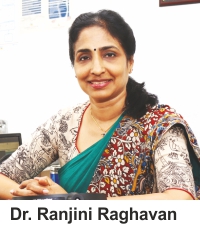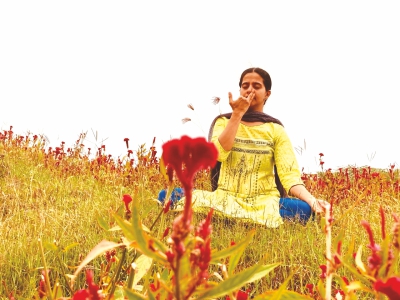PW editors interviewed a cross-section of health, nutrition and lifestyle gurus who advise a ‘holistic approach’ to build robust immune systems especially of children and adolescents – Archana N, Mini P. & Cynthia John

Even as the US, UK and Europe are fighting a deadly second/third wave of the Coronavirus, aka Covid-19 pandemic, fortuitously in India the infections curve has flattened and is moving downwards from peak of 97,860 Covid positive cases per day last September to 9,110 in February. Consequently, the Central and state governments have been progressively easing the restrictions imposed upon reopening of businesses, travel and public congregations.
In early January, state governments also began to cautiously reopen schools for secondary students and in some states for middle and junior schoolers. But even as schools have reopened, student classroom attendance is irregular and sparse. With doubts about the impact of approved vaccines on children not yet cleared, parents are vacillating over granting the mandatory consent for their children to attend in-school classrooms for fear of their becoming infected.
However, it’s pertinent to note that children worldover, and especially in India, have been the least affected by the rampaging virus. As the virus ravaged populations across the world throughout the past year, scientists are puzzled that young children account for only a small percentage of Covid-19 infections and fatalities. Now, latest research suggests that the immune system of children tends to be better equipped to combat the SARS-CoV-2 virus than adult systems. Another contributing factor highlighted by several international studies is that the effect of the BCG vaccine (taken immediately after birth) reduces risk of Covid infection.
Yet even as scientific opinion is veering towards the conclusion that children and adolescents have stronger immune systems to fight the Coronavirus, simultaneously there is rising awareness that this natural advantage needs to be augmented by enhancing children’s immunity to enable them to withstand this and other viruses. And contrary to the opinions of miracle cure advertisers who advocate consumption of immunity-booster concoctions, there’s more to building immunity to the multiplying and fast mutating viruses that have emerged in a global environment ruined by man-made toxins and pollution.
Increasingly, health and wellness pundits and professionals are falling back upon advocacy of traditional prescriptions such as mindful diets, sufficient sleep, regular exercise and stress reduction. PW editors interviewed a cross-section of health, nutrition and lifestyle gurus who advise a ‘holistic approach’ to build robust immune systems especially of children and adolescents.
Breastfeeding
Every infant is born with protective immunity as immunoglobulins pass from her mother to the foetus in the placenta. This natural immunity mediated by immunoglobulins which lasts for about six-nine months after birth, is boosted by breastfeeding.
Paediatricians are unanimous that breast milk contains vital properties that boost the immune system of infants because it is rich in proteins, fats, sugars, antibodies and probiotics. It contains all five types of antibodies: immunoglobulin A (IgA), immunoglobulin D (IgD), immunoglobulin E (IgE), IgG, and immunoglobulin M (IgM). Thick, yellowish breast milk known as colostrum is rich with immunity-building antibodies. Medical evidence is unanimous that six months of exclusive breastfeeding provides infants with immunity-boosters that will hold them in good stead until the age of 18 years.
The Indian Academy of Paediatrics recommends “exclusive breastfeeding for the first six months of life followed by continued breastfeeding for up to two years and beyond with adequate complementary foods as the most appropriate feeding strategy for infants and young children.”
 “Within the community of medical practitioners, there’s unanimity that breastmilk greatly boosts children’s immunity. Even if your infant has a cold infection, you should continue breastfeeding. Ditto if you have an infection. Too many mothers worry unduly about passing on infections to their newborns through breastmilk. A new mother’s body naturally generates antibodies against her own infection and breastmilk contains those antibodies. So whenever you breastfeed, you are helping your infant fight infections,” says Sonali Shivlani, a Mumbai-based lactation and child nutrition counsellor and executive director of CAPPA India (Childbirth and Postpartum Professional Association).
“Within the community of medical practitioners, there’s unanimity that breastmilk greatly boosts children’s immunity. Even if your infant has a cold infection, you should continue breastfeeding. Ditto if you have an infection. Too many mothers worry unduly about passing on infections to their newborns through breastmilk. A new mother’s body naturally generates antibodies against her own infection and breastmilk contains those antibodies. So whenever you breastfeed, you are helping your infant fight infections,” says Sonali Shivlani, a Mumbai-based lactation and child nutrition counsellor and executive director of CAPPA India (Childbirth and Postpartum Professional Association).
Early childhood immunity
0-6 months. In the last three months of pregnancy, mothers pass on antibodies to the foetus through the placenta. This ‘passive’ immunity is boosted when immunoglobins are ingested by breastfed infants.
6-12 months. The human body naturally produces immunity-building cells to fight germs and viruses. Regular intake of iron, zinc, betacarotene and other vitamins, both through dietary sources and iron-fortified foods, helps infants to build robust immune systems. The infant will continue to get some antibodies through breastmilk in this age group, but not as much as the first six months.
1-2 years. Good nutrition, exercise, adequate water and an active lifestyle helps toddlers to strengthen their immune systems.
Vaccination
Early vaccination is critical for protecting children from life-threatening diseases. The immunisation schedule provided by the Indian Academy of Paediatrics lists vaccinations needed for children. Additionally, injection of pneumococcal and rotavirus vaccines is advisable.
 “The National Immunisation Programme for infants and children has been carefully prepared to protect them from six preventable diseases — diptheria, pertussis, tetanus, polio, hemophilus influenza, and hepatitis B as well as pneumonia and diarrhoea. These are life-threatening diseases and often lead to morbidities including neurodisability in children. Vaccination is critical for preventing these diseases in children. The World Health Organisation (WHO) has advised all countries to continue their vaccination programmes as an essential service during the pandemic,” says Dr. Piyush Shah, a consultant, neonatologist & paediatrician at Cloudnine Hospital, Mumbai.
“The National Immunisation Programme for infants and children has been carefully prepared to protect them from six preventable diseases — diptheria, pertussis, tetanus, polio, hemophilus influenza, and hepatitis B as well as pneumonia and diarrhoea. These are life-threatening diseases and often lead to morbidities including neurodisability in children. Vaccination is critical for preventing these diseases in children. The World Health Organisation (WHO) has advised all countries to continue their vaccination programmes as an essential service during the pandemic,” says Dr. Piyush Shah, a consultant, neonatologist & paediatrician at Cloudnine Hospital, Mumbai.
Healthy Nutrition
Healthy nutrition and diet are critical for developing children’s immunity. The first and most important requirement of infants is breast milk followed by food rich in vitamins and minerals, and adequate intake of safe drinking water.
Fibre-rich foods. Whole wheat products and whole grains, fibrous fruits and vegetables flush out toxins and build children’s immunity.
 Vitamins & minerals. Regular intake of Vitamin C, Vitamin A, Betacarotene, Vitamin E, B vitamins, zinc, manganese, selenium and iron also enhances children’s immunity levels. Include fruits, vegetables and other foods rich in these vitamins and minerals in their daily menu. Dr. Gita Mathai, the well-known Vellore-based paediatrician and author of Staying Healthy in Modern India recommends the intake of curry leaves, papaya, broccoli, spinach, capsicum, lime, grapes, oranges, pepper, turmeric, garlic, ginger and yoghurt (probiotics fight infection and are naturally present in yoghurt and other homemade fermented food).
Vitamins & minerals. Regular intake of Vitamin C, Vitamin A, Betacarotene, Vitamin E, B vitamins, zinc, manganese, selenium and iron also enhances children’s immunity levels. Include fruits, vegetables and other foods rich in these vitamins and minerals in their daily menu. Dr. Gita Mathai, the well-known Vellore-based paediatrician and author of Staying Healthy in Modern India recommends the intake of curry leaves, papaya, broccoli, spinach, capsicum, lime, grapes, oranges, pepper, turmeric, garlic, ginger and yoghurt (probiotics fight infection and are naturally present in yoghurt and other homemade fermented food).
Vitamin D. Vitamin D is essential for optimal function of the immune system. The skin absorbs it from the sun. “Encourage your child to go for a cycle ride or run in the morning or at least soak in the morning sun from the home balcony or terrace,” advises Dr. Mathai.
Water. Water shapes 70 percent of every human body. It regulates body temperature, assists digestion and waste excretion. Adequate intake of water (6-8 glasses per day) is crucial to prevent dehydration in children.
“Drinking water can help improve the overall immunity of the body. Staying hydrated helps the body to naturally eliminate the bacteria and toxins that cause infection. With water intake, oxygen and nutrients are distributed through the body, and waste material is flushed out. Thus, it helps keep diseases at bay,” writes Advaitaa Ravi in a blog reviewed by Dr. Kaustav Guha, director, R&D Division, SkinKraft Labs.
Exercise
 Moderate to intense exercise improves blood circulation and flushes out toxins. It increases the heart beat and blood circulation, pumping it through dilated vessels and supplying an army of WBC and immunoglobulins to the body. It also releases endorphins or ‘happy hormones’.
Moderate to intense exercise improves blood circulation and flushes out toxins. It increases the heart beat and blood circulation, pumping it through dilated vessels and supplying an army of WBC and immunoglobulins to the body. It also releases endorphins or ‘happy hormones’.
Ensure children get at least 60 minutes of sports, dance or any other physical activity every day, six days a week. “My daughter has been practising gymnastics for two years, switching to online training during the pandemic, and now again offline. Since then, I have observed marked improvement in her health and well-being; she doesn’t fall sick as often as she used to. Moreover when the entire family tested Covid positive recently, her illness was very mild,” avers Payal Rojesera, a Bengaluru-based homemaker whose 11-year-old daughter Diva, has been practising gymnastics throughout the pandemic.
Sleep
Persistent sleep deprivation weakens the immune system and generates body fat. The hormone leptin is secreted by the body’s fat cells during sleep. Inadequate sleep reduces the time available for the release of this hormone, prompting children to crave high-fat and carbohydrate-rich foods. The body also produces a protein — cytokines — which fights infections, illness and stress, as children sleep. Decreased cytokines renders children vulnerable to viral and other infections.
 “Restful and adequate sleep is critically important for the physical and mental growth of children. It’s the time when the body heals and repairs, and crucial brain development occurs. As maximum brain development happens in early childhood, young children need 11-13 hours of sleep every night. As they grow older, they still need at least nine hours of sleep per day. Numerous studies have conclusively proved that restful sleep builds body immunity, memory and enhances recall, concentration and learning capabilities,” says Dr. Ranjini Raghavan, senior consultant ENT surgeon and sleep specialist at the Sunrise Hospital, Kakkanad (Kochi).
“Restful and adequate sleep is critically important for the physical and mental growth of children. It’s the time when the body heals and repairs, and crucial brain development occurs. As maximum brain development happens in early childhood, young children need 11-13 hours of sleep every night. As they grow older, they still need at least nine hours of sleep per day. Numerous studies have conclusively proved that restful sleep builds body immunity, memory and enhances recall, concentration and learning capabilities,” says Dr. Ranjini Raghavan, senior consultant ENT surgeon and sleep specialist at the Sunrise Hospital, Kakkanad (Kochi).
In the pandemic era, prolonged online learning has disrupted children’s waking and sleep routines. Here are some ways to ensure children develop healthy sleep habits:
- Ban all digital gadgets half an hour prior to bedtime. The blue light emitted by cell phones, computers, tablets, and television sets reduces the production of melatonin, the hormone that controls the sleep/wake cycle or circadian rhythm. Reduced melatonin production makes it harder to fall and remain asleep. Therefore it’s advisable that children have at least 30 minutes of gadget-free transition time before getting into bed. Even better, make the child’s bedroom a technology-free zone — remove television sets and all other electronic devices.
- Introduce bedtime routines and rituals. Ensure your child sleeps and wakes up at the same time during the school term and holidays. Children mentally associate predictable bedtime rituals with restfulness. Get her to put her toys away, give her a warm bath, brush her teeth, get her to wear her pajamas and settle down to listen to a bedtime story. A set routine signals her mind and body that it’s time to wind down.
- Exercise and physical activity. If children are physically active, a good night’s sleep will follow. Physical activity is not necessarily synonymous with organised sports and games. Running, cycling, swimming for 45-60 minutes or 15 minutes of climbing stairs continuously provides the physical fatigue which is the prerequisite of deep sleep.
- Set an example. Get off your own mobile and other screens at least two hours before bedtime, and go to bed at a regular time — your children will learn and emulate your sleep habits.
- Ban caffeinated beverages (coffee, tea, aerated drinks, energy drinks) for children below 16 years of age.
Bust stress, boost immunity
 “It is scientifically proven that stress reduces immunity,” says Hyderabad-based psychologist Priyanka Naveen, founder of TruHap, a Positive Psychology Centre. “When an individual is stressed, the body releases the hormone corticosteroid which suppresses the immune system by reducing the natural production of lymphocytes. All this makes the body vulnerable and an easy target for viruses,” says Naveen.
“It is scientifically proven that stress reduces immunity,” says Hyderabad-based psychologist Priyanka Naveen, founder of TruHap, a Positive Psychology Centre. “When an individual is stressed, the body releases the hormone corticosteroid which suppresses the immune system by reducing the natural production of lymphocytes. All this makes the body vulnerable and an easy target for viruses,” says Naveen.
Dr. Naveen’s prescription for building bodily immunity is for families to eat healthy, maintain daily sleep, work and play routines, exercise regularly, make time to connect with extended family and friends, and to regularly schedule family dinners and outings. “It is also important for parents to focus on their own well-being. Being a full-time child caregiver, working professional, teacher and cook can be overwhelming. That’s why parents need to focus on reducing their own stress levels before easing the anxieties of their children,” she says.
Breathing exercises boost immunity
 Yoga practitioners strongly recommended pranayama i.e, breathing exercises to improve immunity. “Pranayama is the ancient practice of controlling the timing, duration, and frequency of every breath. Controlled breathing has a positive effect on the body by lowering cortisol levels and blood pressure, and improving arterial blood flow. Pranayama soothes the nervous system and improves the body’s stress response. Moreover, it calms and prepares the body for sleep,” says Sunayna SP, a Bengaluru-based yoga instructor.
Yoga practitioners strongly recommended pranayama i.e, breathing exercises to improve immunity. “Pranayama is the ancient practice of controlling the timing, duration, and frequency of every breath. Controlled breathing has a positive effect on the body by lowering cortisol levels and blood pressure, and improving arterial blood flow. Pranayama soothes the nervous system and improves the body’s stress response. Moreover, it calms and prepares the body for sleep,” says Sunayna SP, a Bengaluru-based yoga instructor.
She recommends the following breathing exercises:
- Alternate nostril breathing (nadishodhana)
- Victorious breath (ujjayi)
- Female honeybee humming breath (bhramari)
- Bellows breath (bastrika)
Also read: Immunity boosting treats























